Fecal microbiota transplantation for the treatment of recurrent Clostridioides difficile (Clostridium difficile)
- PMID: 37096495
- PMCID: PMC10125800
- DOI: 10.1002/14651858.CD013871.pub2
Fecal microbiota transplantation for the treatment of recurrent Clostridioides difficile (Clostridium difficile)
Abstract
Background: Clostridioides difficile (formerly known as Clostridium difficile) is a bacterium that can cause potentially life-threatening diarrheal illness in individuals with an unhealthy mixture of gut bacteria, known as dysbiosis, and can cause recurrent infections in nearly a third of infected individuals. The traditional treatment of recurrent C difficile infection (rCDI) includes antibiotics, which may further exacerbate dysbiosis. There is growing interest in correcting the underlying dysbiosis in rCDI using of fecal microbiota transplantation (FMT); and there is a need to establish the benefits and harms of FMT for the treatment of rCDI based on data from randomized controlled trials.
Objectives: To evaluate the benefits and harms of donor-based fecal microbiota transplantation for the treatment of recurrent Clostridioides difficile infection in immunocompetent people.
Search methods: We used standard, extensive Cochrane search methods. The latest search date was 31 March 2022.
Selection criteria: We considered randomized trials of adults or children with rCDI for inclusion. Eligible interventions must have met the definition of FMT, which is the administration of fecal material containing distal gut microbiota from a healthy donor to the gastrointestinal tract of a person with rCDI. The comparison group included participants who did not receive FMT and were given placebo, autologous FMT, no intervention, or antibiotics with activity against C difficile.
Data collection and analysis: We used standard Cochrane methods. Our primary outcomes were 1. proportion of participants with resolution of rCDI and 2. serious adverse events. Our secondary outcomes were 3. treatment failure, 4. all-cause mortality, 5. withdrawal from study, 6. rate of new CDI infection after a successful FMT, 7. any adverse event, 8. quality of life, and 9. colectomy. We used the GRADE criteria to assess certainty of evidence for each outcome.
Main results: We included six studies with 320 participants. Two studies were conducted in Denmark, and one each in the Netherlands, Canada, Italy, and the US. Four were single-center and two were multicenter studies. All studies included only adults. Five studies excluded people who were severely immunocompromised, with only one study including 10 participants who were receiving immunosuppressive therapy out of the 64 enrolled; these were similarly distributed between the FMT arm (4/24 or 17%) and comparison arms (6/40 or 15%). The route of administration was the upper gastrointestinal tract via a nasoduodenal tube in one study, two studies used enema only, two used colonoscopic only delivery, and one used either nasojejunal or colonoscopic delivery, depending on a clinical determination of whether the recipient could tolerate a colonoscopy. Five studies had at least one comparison group that received vancomycin. The risk of bias (RoB 2) assessments did not find an overall high risk of bias for any outcome. All six studies assessed the efficacy and safety of FMT for the treatment of rCDI. Pooled results from six studies showed that the use of FMT in immunocompetent participants with rCDI likely leads to a large increase in resolution of rCDI in the FMT group compared to control (risk ratio (RR) 1.92, 95% confidence interval (CI) 1.36 to 2.71; P = 0.02, I2 = 63%; 6 studies, 320 participants; number needed to treat for an additional beneficial outcome (NNTB) 3; moderate-certainty evidence). Fecal microbiota transplantation probably results in a slight reduction in serious adverse events; however, the CIs around the summary estimate were wide (RR 0.73, 95% CI 0.38 to 1.41; P = 0.24, I² = 26%; 6 studies, 320 participants; NNTB 12; moderate-certainty evidence). Fecal microbiota transplantation may result in a reduction in all-cause mortality; however, the number of events was small, and the CIs of the summary estimate were wide (RR 0.57, 95% CI 0.22 to 1.45; P = 0.48, I2 = 0%; 6 studies, 320 participants; NNTB 20; low-certainty evidence). None of the included studies reported colectomy rates.
Authors' conclusions: In immunocompetent adults with rCDI, FMT likely leads to a large increase in the resolution of recurrent Clostridioides difficile infection compared to alternative treatments such as antibiotics. There was no conclusive evidence regarding the safety of FMT for the treatment of rCDI as the number of events was small for serious adverse events and all-cause mortality. Additional data from large national registry databases might be required to assess any short-term or long-term risks with using FMT for the treatment of rCDI. Elimination of the single study that included some immunocompromised people did not alter these conclusions. Due to the low number of immunocompromised participants enrolled, conclusions cannot be drawn about the risks or benefits of FMT for rCDI in the immunocompromised population.
배경: Clostridioides difficile(이전에는Clostridium difficile로 알려짐)은 세균불균형으로 알려진 장내 세균의 건강에 해로운 혼합물이 있는 개인에게 잠재적으로 생명을 위협하는 설사병을 일으킬 수 있는 박테리아이며, 감염된 개인의 거의 1/3에서 재발성 감염을 일으킬 수 있다. 재발성C difficile감염(rCDI)의 전통적인 치료에는 항생제가 포함되며, 이는 세균불균형을 더욱 악화시킬 수 있다. 배설물 미생물 이식술(FMT)을 사용하여 rCDI의 근본적인 세균불균형을 교정하는 데 관심이 높아지고 있으며, 무작위 대조 시험의 데이터를 기반으로 rCDI 치료에 대한 FMT의 이점과 위해를 확립할 필요가 있다. 목적: 면역 능력이 있는 사람들의 재발성Clostridioides difficile 감염 치료를 위한 기증자 기반 대변 미생물 이식의 이점과 위해를 평가한다. 검색 전략: 표준적이고 광범위한 코크란 검색 방법을 사용했다. 최근 검색 날짜는 2022년 3월 31일이었다. 선정 기준: 포함을 위해 rCDI가 있는 성인 또는 어린이의 무작위 시험을 고려했다. 적격 중재는 FMT의 정의를 충족해야 하며, 이는 건강한 기증자의 원위 장내 미생물을 포함하는 대변 물질을 rCDI 환자의 위장관에 투여하는 것이다. 비교 그룹에는 FMT를 받지 않고 위약, 자가 FMT, 무중재 또는C difficile에 대한 활성이 있는 항생제를 받은 참가자가 포함되었다. 자료 수집 및 분석: 표준 코크란 방법을 사용했다. 주요 결과는 1. rCDI가 해결된 참가자 비율 및 2. 심각한 부작용이었다. 2차 결과는 3. 치료 실패, 4. 모든 원인으로 인한 사망, 5. 연구 중단, 6. 성공적인 FMT 후 새로운 CDI 감염률, 7. 모든 부작용, 8. 삶의 질, 9. 결장절제술이었다. GRADE 접근법을 사용하여 각 결과에 대한 근거의 확실성을 평가했다. 주요 결과: 참가자 320명이 포함된 6건의 연구를 포함했다. 덴마크에서 2건의 연구가 수행되었고 네덜란드, 캐나다, 이탈리아 및 미국에서 각각 1건씩 수행되었다. 4개는 단일 센터 연구였고 2개는 다기관 연구였다. 모든 연구에는 성인만 포함되었다. 5건의 연구는 심하게 면역이 손상된 사람들을 제외했으며, 등록된 64명 중 면역억제 요법을 받고 있는 10명의 참가자를 포함하는 연구는 1건뿐이었다. 이들은 FMT 부문(4/24 또는 17%)과 비교 부문(6/40 또는 15%) 간에 유사하게 분포되었다. 투여 경로는 대장내시경을 견딜 수 있는지 여부에 대한 임상적 판단에 따라 1건의 연구에서 비십이지장관을 통한 상부 위장관이었고, 2건의 연구는 관장만을 사용했고, 2건은 대장내시경 전용 전달을 사용했으며, 1건은 비공장 또는 결장경 전달을 사용했다. 5건의 연구에는 반코마이신을 받은 대조군이 하나 이상 있었다. 비뚤림 위험(RoB 2) 평가는 어떤 결과에 대해서도 전반적으로 높은 비뚤림 위험을 찾지 못했다. 6건의 연구 모두 rCDI 치료에 대한 FMT의 효능과 안전성을 평가했다. 6건의 연구에서 종합한 결과에 따르면 rCDI가 있는 면역 능력이 있는 참가자에서 FMT를 사용하면 대조군에 비해 FMT 그룹에서 rCDI의 해상도가 크게 증가할 가능성이 높다(위험비(RR) 1.92, 95% 신뢰 구간(CI) 1.36 ~ 2.71, P = 0.02, I2= 63%, 6건의 연구, 320명의 참가자, 추가적인 유익한 결과(NNTB) 3을 위해 치료에 필요한 수, 근거 확실성 중간). 대변 미생물 이식술은 아마도 심각한 부작용을 약간 감소시키는 결과를 가져올 것이다. 그러나 요약 추정치 주변의 CI는 넓었다(RR 0.73, 95% CI 0.38 ~ 1.41; P = 0.24, I² = 26%; 6건의 연구, 320명의 참가자; NNTB 12; 근거 확실성 중간). 대변 미생물군 이식술은 모든 원인으로 인한 사망률을 감소시킬 수 있다. 그러나 사건의 수는 적었고 요약 추정치의 CI는 넓었다(RR 0.57, 95% CI 0.22 ~ 1.45; P = 0.48, I2= 0%; 6건의 연구, 320명의 참가자; NNTB 20; 낮은 확실한 근거). 포함된 연구 중 어느 것도 결장 절제술 비율을 보고하지 않았다. 연구진 결론: rCDI가 있는 면역 능력이 있는 성인에서 FMT는 항생제와 같은 대체 치료법에 비해 재발성Clostridioides difficile감염의 해결을 크게 증가시킬 가능성이 있다. 중대한 부작용 및 모든 원인으로 인한 사망에 대한 사건의 수가 적기 때문에 rCDI 치료에 대한 FMT의 안전성에 관한 결정적인 근거는 없었다. rCDI 치료를 위해 FMT를 사용하는 경우 단기 또는 장기 위험을 평가하려면 대규모 국가 등록 데이터베이스의 추가 데이터가 필요할 수 있다. 일부 면역력이 약화된 사람들이 포함된 단일 연구를 제거해도 이러한 결론이 변경되지 않았다. 등록된 면역 저하 참가자의 수가 적기 때문에 면역 저하 인구의 rCDI에 대한 FMT의 위해 또는 이점에 대한 결론을 도출할 수 없다.
Trial registration: ClinicalTrials.gov NCT03053505.
Copyright © 2023 The Cochrane Collaboration. Published by John Wiley & Sons, Ltd.
Conflict of interest statement
NZM: none.
AI: none.
SA: none.
MM: none.
ETS: none.
JZ: Dr Zackular's research laboratory receives research funding from BioNTech, but Dr Zackular does not receive any compensation for this work.
SA: none.
MN: National Institute of Allergy and Infectious Diseases K23 award [No. 1K23AI156132‐01] to MRN. Dr Nicholson serves on a data and safety monitoring board for Summit Therapeutics.
Figures
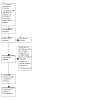
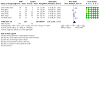
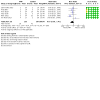
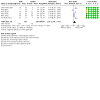
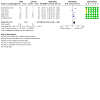
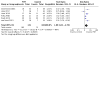
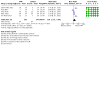
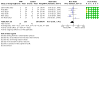
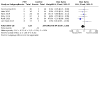
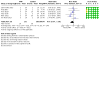

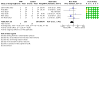
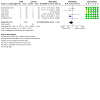
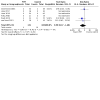

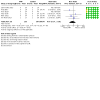
Update of
References
References to studies included in this review
Cammarota 2015 {published data only}
-
- Cammarota G, Masucci L, Ianiro G, Bibbo S, Dinoi G, Costamagna G, et al. Randomised clinical trial: faecal microbiota transplantation by colonoscopy vs. vancomycin for the treatment of recurrent Clostridium difficile infection. Alimentary Pharmacology and Therapeutics 2015;41(9):835-43. [DOI: 10.1111/apt.13144] - DOI - PubMed
Hota 2017 {published data only}
-
- Hota SS, Sales V, Tomlinson G, Salpeter MJ, McGeer A, Coburn B, et al. Oral vancomycin followed by fecal transplantation versus tapering oral vancomycin treatment for recurrent Clostridium difficile infection: an open-label, randomized controlled trial. Clinical Infectious Diseases 2017;64(3):265-71. [DOI: 10.1093/cid/ciw731] - DOI - PubMed
Hvas 2019 {published data only}
Kelly 2016 {published data only}
Rode 2021 {published data only}
-
- Rode AA, Chehri M, Krogsgaard LR, Heno KK, Svendsen AT, Ribberholt I, et al. Randomised clinical trial: a 12-strain bacterial mixture versus faecal microbiota transplantation versus vancomycin for recurrent Clostridioides difficile infections. Alimentary Pharmacology and Therapeutics 2021;53(9):999-1009. [DOI: 10.1111/apt.16309] - DOI - PubMed
References to studies excluded from this review
Allegretti 2016 {published data only}
-
- Allegretti JR, Fischer M, Papa E, Elliott R J, Klank J, Mendolia G, et al. Fecal microbiota transplantation delivered via oral capsules achieves microbial engraftment similar to traditional delivery modalities: safety, efficacy and engraftment results from a multi-center cluster randomized dose-finding study. American Gastroenterological Association Abstracts 2016;150(4):S540. [DOI: 10.1016/S0016-5085(16)31855-8] - DOI
-
- Allegretti JR, Fischer M, Papa E, Elliott R J, Klank J, Mendolia G, et al. Fecal microbiota transplantation delivered via oral capsules achieves microbial engraftment similar to traditional delivery modalities: safety, efficacy and engraftment results from a multi-center cluster randomized dose-finding study. Digestive Disease Week 2016;1:S540.
Allegretti 2019 {published data only}
-
- Allegretti JR, Fischer M, Sagi SV, Bohm ME, Fadda HM, Ranmal SR, et al. Fecal microbiota transplantation capsules with targeted colonic versus gastric delivery in recurrent Clostridium difficile infection: a comparative cohort analysis of high and lose dose. Digestive Diseases and Sciences 2019;64:1672-8. [DOI: 10.1007/s10620-018-5396-6] - DOI - PubMed
Cicerone 2017 {published data only}
-
- Cicerone C, Bruno G, Lamonaca L, D'Abramo A, Oliva A, Zingaropoli MA. Fecal microbiota transplantation via enema for recurrent Clostridium difficile infection modulates the inflammatory host response and restores intestinal dysbiosis. Digestive and Liver Disease 2017;49:e103. [DOI: 10.1016/S1590-8658(17)30354-7] - DOI
Dupont 2017 {published data only}
-
- Dupont H, Jiang ZD, Alexander A, Ajami N, Petrosino JF, DuPont AW, et al. Lyophilized fecal microbiota transplantation capsules for recurrent Clostridium difficile infection. Open Forum Infectious Diseases 2017;4(Suppl 1):S381. [DOI: 10.1093/ofid/ofx163.943] - DOI
Fischer 2015 {published data only}
-
- Fischer M, Allegretti JR, Smith M, Klank MJ, Mendolia G, Vo E, et al. A multi-center, cluster randomized dose-finding study of fecal microbiota transplantation capsules for recurrent Clostridium difficile infection. United European Gastroenterology Journal 2015;3(6):565-66. [DOI: 10.1177/2050640615616068] - DOI
Friedman‐Korn 2018 {published data only}
Garza‐Gonzalez 2019 {published data only}
-
- Garza-Gonzalez E, Mendoza-Olazaran S, Morfin-Otero R, Ramirez-Fontes A, Rodriguez-Zulueta P, Flores-Trevino S, et al. Intestinal microbiome changes in fecal microbiota transplant (FMT) vs. FMT enriched with Lactobacillus in the treatment of recurrent Clostridioides difficile infection. Canadian Journal of Gastroenterology and Hepatology 2019;2019:4549298. [ARTICLE ID: 4549298] [DOI: 10.1155/2019/4549298] - DOI - PMC - PubMed
Ianiro 2018 {published data only}
-
- Ianiro G, Masucci L, Quaranta G, Simonelli C, Lopetuso LR, Sanguinetti M, et al. Randomised clinical trial: faecal microbiota transplantation by colonoscopy plus vancomycin for the treatment of severe refractory Clostridium difficile infection – single versus multiple infusions. Alimentary Pharmacology and Therapeutics 2018;48:152-9. - PubMed
-
- Ianiro G, Masucci L, Quaranta G, Simonelli C, Rizzatti G, Lopetuso L, et al. Randomized clinical trial: single-infusion FMT versus multiple-infusion FMT for the treatment of severe C. difficile infection. Digestive and Liver Disease 2018;50(2 Suppl):e66-7.
Jiang 2017 {published data only}
-
- Jiang ZD, Ajami NJ, Petrosino JF, Jun G, Hanis CL, Shah M, et al. Randomised clinical trial: faecal microbiota transplantation for recurrent Clostridium difficile infection – fresh, or frozen, or lyophilised microbiota from a small pool of healthy donors delivered by colonoscopy. Alimentary Pharmacology and Therapeutics 2017;45:899-908. [DOI: 10.1111/apt.13969] - DOI - PubMed
Jiang 2018b {published data only}
-
- Jiang ZD, Jenq RR, Ajami NJ, Petrosino JF, Alexander AA, Shi KS, et al. Safety and preliminary efficacy of orally administered lyophilized fecal microbiota product compared with frozen product given by enema for recurrent Clostridium difficile infection: a randomized clinical trial. PLOS One 2018;13(11):e0205064. [DOI: 10.1371/journal.pone.0205064] - DOI - PMC - PubMed
Jiang 2018c {published data only}
-
- Jiang ZD, Jenq R, Ajami N, DuPont HL. The effect of type of inoculum and administration route of fecal microbiota transplantation in subjects with recurrent Clostridium difficile infection. Gastroenterology 2018;154(6):S892.
JPRN‐UMIN000016900 {published data only}
-
- JPRN-UMIN000016900. Fecal microbiota transplantation for Clostridium difficile infection. trialsearch.who.int/Trial2.aspx?TrialID=JPRN-UMIN000016900 (first received 24 March 2015).
JPRN‐UMIN000019181 {published data only}
-
- JPRN-UMIN000019181. Fecal microbiota transplantation for refractory Clostridium difficile infection. trialsearch.who.int/Trial2.aspx?TrialID=JPRN-UMIN000019181 (first received 1 November 2015).
JPRN‐UMIN000020766 {published data only}
-
- JPRN-UMIN000019181. Fecal microbiota transplantation for Clostridium difficile infection. trialsearch.who.int/Trial2.aspx?TrialID=JPRN-UMIN000020766 (first received 27 January 2016).
Kao 2017 {published data only}
-
- Kao D, Roach B, Beck P, Hotte N, Madsen K, Louie T. A dual center, randomized trial comparing colonoscopy and oral capsule delivered fecal microbiota transplantation in the treatment of recurrent Clostridium difficile infection: preliminary results. American Journal of Gastroenterology 2015;110:S553.
-
- Kao D, Roach B, Hotte N, Silva M, Madsen K, Beck P, et al. A prospective, dual center, randomized trial comparing colonoscopy versus capsule delivered fecal microbiota transplantation in the management of recurrent Clostridium difficile infection. Canadian Journal of Gastroenterology and Hepatology 2016;318(20):71-2.
Kates 2020 {published data only}
-
- Kates AE, Gaulke I, De Wolfe T, Zimbric M, Haight K, Watson L, et al. Fecal microbiota transplantation for patients on antibiotic treatment with C. difficile infection history (GRAFT): study protocol for a phase II, randomized, double-blind, placebo-controlled trial to prevent recurrent C. difficile infections. Contemporary Clinical Trials Communications 2020;18:6. [DOI: 10.1016/j.conctc.2020.100576] - DOI - PMC - PubMed
-
- NCT03621657. The GRAFT study: gut recolonization by fecal transplantation (GRAFT) [A phase II randomized, double-blind placebo-controlled trial to determine if fecal microbiota transplantation is efficacious for hospitalized patients with C. difficile infection history during antibiotic treatment]. clinicaltrials.gov/ct2/show/NCT03621657 (first received 8 august 2018). [NATIONAL CLINICAL TRIAL NUMBER: NCT03621657]
Lee 2016 {published data only}
-
- Lee CH, Steiner T, Petrof EO, Smieja M, Roscoe D, Nematallah A, et al. Frozen vs fresh fecal microbiota transplantation and clinical resolution of diarrhea in patients with recurrent Clostridium difficile infection a randomized clinical trial. Journal of the American Medical Association 2016;315(2):142-9. [DOI: 10.1001/jama.2015.18098] - DOI - PubMed
Lee 2019 {published data only}
-
- Lee CH, Chai J, Hammond K, Jeon SR, Patel Y, Goldeh C, et al. Long-term durability and safety of fecal microbiota transplantation for recurrent or refractory Clostridioides difficile infection with or without antibiotic exposure. European Journal of Clinical Microbiology & Infectious Diseases 2019;38:1731-5. [DOI: 10.1007/s10096-019-03602-2] - DOI - PubMed
Martinez 2018 {published data only}
NCT01398969 {published data only}
-
- NCT01398969. Multi-centre trial of fresh vs. frozen-and-thawed FMT for recurrent CDI. clinicaltrials.gov/ct2/show/NCT01398969 (first received 11 July 2011). [NATIONAL CLINICAL TRIAL NUMBER: NCT01398969]
NCT01704937 {published data only}
-
- NCT01704937. Fecal microbiota transplant (FMT) for relapsing C. difficile infection in adults and children using a frozen inoculum. clinicaltrials.gov/ct2/show/NCT01704937 (first received 12 October 2012). [NATIONAL CLINICAL TRIAL NUMBER: NCT01704937]
NCT02254811 {published data only}
-
- NCT02254811. FMT delivered by capsule versus colonoscopy for recurrent C. diff [A prospective, multi-center, randomized trial of fecal microbiota transplantation (FMT) delivered by capsule vs colonoscopy in the management of recurrent Clostridium difficile infection (CDI)]. clinicaltrials.gov/ct2/show/NCT02254811 (first received 2 October 2014). [NATIONAL CLINICAL TRIAL NUMBER: NCT02254811]
NCT02318992 {published and unpublished data}
-
- NCT02318992. Fresh, frozen or lyophilized fecal microbiota transplantation for multiple recurrent C. difficile associated diarrhea. clinicaltrials.gov/ct2/show/NCT02318992 (first received 18 December 2014). [NATIONAL CLINICAL TRIAL NUMBER: NCT02318992]
NCT03298048 {published and unpublished data}
-
- NCT03298048. Dose ranging study of the safety and efficacy of orally administered lyophilized fecal microbiota product (PRIM-DJ2727) for the treatment of recurrent Clostridium difficile infection (Cdi). clinicaltrials.gov/ct2/show/NCT03298048 (first received 29 September 2017). [NATIONAL CLINICAL TRIAL NUMBER: NCT03298048]
NCT03427229 {published data only}
-
- NCT03427229. Fecal microbiota transplantation for severe Clostridium difficile infection [Randomized clinical trial: single versus multiple-infusion fecal microbiota transplantation for severe Clostridium difficile infection]. clinicaltrials.gov/ct2/show/NCT03427229 (first received 9 February 2018). [NATIONAL CLINICAL TRIAL NUMBER: NCT03427229]
NCT03804736 {published data only}
-
- NCT03804736. Fecal microbiota transplant by oral capsules enriched with Lactobacilli for recurrent Clostridium difficile infection. clinicaltrials.gov/ct2/show/NCT03804736 (first received 15 January 2019). [NATIONAL CLINICAL TRIAL NUMBER: NCT03804736]
Satokari 2015 {published data only}
-
- Satokari R, Mattila E, Kainulainen V, Arkkila PE. Simple faecal preparation and efficacy of frozen inoculum in faecal microbiota transplantation for recurrent Clostridium difficile infection – an observational cohort study. Alimentary Pharmacology & Therapeutics 2015;41(1):46-53. [DOI: 10.1111/apt.13009] - DOI - PubMed
Youngster 2014 {published data only}
-
- Youngster I, Sauk J, Pindar C, Wilson RG, Kaplan JL, Smith MB, et al. Fecal microbiota transplant for relapsing Clostridium difficile infection using a frozen inoculum from unrelated donors: a randomized, open-label, controlled pilot study. Clinical Infectious Diseases 2014;58(11):1515-22. [DOI: 10.1093/cid/ciu135] - DOI - PMC - PubMed
References to studies awaiting assessment
Dubberke 2018 {published data only}
-
- Dubberke ER, Lee C, Orenstein R, Khanna S, Hecht G, Fraiz J. Efficacy and safety of RBX2660 for the prevention of recurrent Clostridium difficile infection: results of the PUNCH CD 2 trial. Open Forum Infectious Diseases 2016;3(Suppl 1):1341. [DOI: 10.1093/ofid/ofw172.1044] - DOI
-
- Dubberke ER, Lee CH, Orenstein R, Khanna S, Hecht G, Gerding DN. Results from a randomized, placebo-controlled clinical trial of a RBX2660 – a microbiota-based drug for the prevention of recurrent Clostridium difficile infection [A Phase 2B Prospective, Randomized, Double-blinded, Placebo-controlled Clinical Study Demonstrating the Efficacy and Safety of Rebiotix RBX2660 (Microbiota Suspension) for the Treatment of Recurrent Clostridium Difficile Infection]. Clinical Infectious Diseases 2018;67(8):1198-204. [DOI: 10.1093/cid/ciy259] - DOI - PubMed
-
- Hecht GA, Orenstein R, Dubberke ER, Lee C, Khanna S. Lack of association with patient demographics and outcomes in PUNCH CD2, a randomized controlled trial of RBX2660, a microbiota-based drug for recurrent Clostridium difficile infection. American Gastroenterological Association Abstracts 2017;152(5):S951-2. [DOI: 10.1016/S0016-5085(17)33238-9] - DOI
-
- NCT02299570. Microbiota restoration therapy for recurrent Clostridium difficile infection (Punchcd2) [A phase 2b prospective, randomized, double-blinded, placebo-controlled clinical study demonstrating the efficacy and safety of Rebiotix RBX2660 (microbiota suspension) for the treatment of recurrent Clostridium difficile infection]. clinicaltrials.gov/ct2/show/NCT02299570 (first received 24 November 2014). [NATIONAL CLINICAL TRIAL NUMBER: NCT02299570]
-
- Ramesh MS, Khanna S, Messer J, Adams M. Durable prevention of recurrent C. difficile infection with RBX2660: results of the PUNCH CD 2 trial. American Journal of Gastroenterology 2016;111:S93.
Kao 2019 {published data only}
-
- Kao DH, Roach B, Walter J, Loebenberg R, Wong K. Effect of lyophilized sterile fecal filtrate vs lyophilized donor stool on recurrent Clostridoides difficile infection: preliminary results from a randomized, double-blind pilot study. American Gastroenterological Association Abstracts 2019;156(6):S-900.
NCT03353506 {published data only}
-
- NCT03353506. Lyophilized fecal transplant vs lyophilized fecal filtrate in recurrent C diff infection [A prospective double blind randomized pilot study comparing the efficacy of lyophilized fecal microbiota transplantation (FMT) to lyophilized sterile fecal filtrate in the management of recurrent Clostridium difficile infection (CDI)]. clinicaltrials.gov/ct2/show/NCT03353506 (first received 27 November 2017). [NATIONAL CLINICAL TRIAL NUMBER: NCT03353506]
NCT03548051 {unpublished data only}
-
- NCT03548051. Safety and efficacy of FMT in individuals with one or more recurrences of Clostridium difficile associated disease (CDAD) [Phase 1/2 placebo controlled, partially-blinded clinical trial to assess the safety and efficacy of microbial restoration by enema with banked and thawed processed stool in individuals with one or more recurrences of Clostridium difficile associated disease (CDAD)]. clinicaltrials.gov/ct2/show/NCT03548051 (first received 6 June 2018).
References to ongoing studies
Drekonja 2021 {published data only}
-
- Drekonja DM, Shaukat A, Zhang JH, Reinink AR, Nugent S, Dominitz JA, et al. Microbiota or placebo after antimicrobial therapy for recurrent Clostridioides difficile at home: a clinical trial with novel home-based enrollment. Clinical Trials 2021;18(5):622-9. [DOI: 10.1177/17407745211021198] - DOI - PubMed
EUCTR2015‐003062‐82‐DK {published data only}
-
- EUCTR2015-003062-82-DK. Rectal bacteriotherapy, faecal microbiota transplantation or oral vancomycin for the treatment of recurrent Clostridium difficile infection: a randomised controlled trial. clinicaltrialsregister.eu/ctr-search/trial/2015-003062-82/DK (first received 11 January 2016).
NCT02255305 {unpublished data only}
-
- NCT02255305. FMT versus antimicrobials for initial treatment of recurrent CDI [Fecal microbiota transplantation versus standard medical therapy for initial treatment of recurrent Clostridium difficile infection]. clinicaltrials.gov/ct2/show/NCT02255305 (first received 2 October 2014).
NCT02774382 {unpublished data only}
-
- NCT02774382. Rectal bacteriotherapy, fecal microbiota transplantation or oral vancomycin treatment of recurrent Clostridium difficile infections. clinicaltrials.gov/ct2/show/NCT02774382 (first received 17 May 2016).
NCT03005379 {published and unpublished data}
-
- NCT03005379. Microbiota or placebo after antimicrobial therapy for recurrent C. difficile at home (MATCH). clinicaltrials.gov/ct2/show/NCT03005379 (first received 29 December 2016).
NCT03053505 {unpublished data only}
-
- NCT03053505. A novel faecal microbiota transplantation system for treatment of primary and recurrent Clostridium difficile infection (FMTREAT) [Two-arm, interventional, prospective, open-label, multi-center trial to evaluate the safety & effectiveness of FMT for treatment of adult patients with primary or recurrent CDI, using a novel, standardized microbiota transplantation system]. clinicaltrials.gov/ct2/show/NCT03053505 (first received 15 February 2017).
NCT03806803 {unpublished data only}
-
- NCT03806803. Multicentre blinded comparison of lyophilized sterile fecal filtrate to lyophilized fecal microbiota transplant in recurrent Clostridioides difficile infection [A multicenter double blind randomized study comparing the efficacy of lyophilized sterile fecal filtrate to lyophilized fecal microbiota transplantation (FMT) in the management of recurrent Clostridioides difficile infection (CDI)]. clinicaltrials.gov/ct2/show/NCT03806803 (first received 16 January 2019). [NATIONAL CLINICAL TRIAL NUMBER: NCT03806803]
NCT03970200 {published and unpublished data}
-
- NCT03970200. PMT for severe-CDI [A phase II, randomized trial to evaluate the safety and efficacy of fecal microbiota transplantation using the Penn microbiome therapy products for severe or severe-complicated/fulminant Clostridium difficile infection]. clinicaltrials.gov/ct2/show/NCT03970200 (first received 16 January 2020).
NCT04885946 {unpublished data only}
-
- NCT04885946. Fecal microbiota transplantation for early Clostridioides difficile infection (EarlyFMT). clinicaltrials.gov/ct2/show/NCT04885946 (first received 12 May 2021).
NCT04960306 {unpublished data only}
-
- NCT04960306. Fecal filtrate as a treatment option of multiple recurrent Clostridioides difficile infection (FILTRATE) [Fecal filtrate versus conventional microbiota transplantation in the treatment of multiple recurrent Clostridioides difficile infection (FILTRATE): a protocol of a randomized, controlled trial]. clinicaltrials.gov/ct2/show/NCT04960306 (first received 13 July 2021).
NCT05077085 {unpublished data only}
-
- NCT05077085. Bezlotoxumab versus FMT for multiple recurrent CDI (BSTEP) [New treatment strategy for patients with multiple recurrent Clostridioides difficile infection with bezlotoxumab as first option]. clinicaltrials.gov/ct2/show/NCT05077085 (first received 13 October 2021).
NCT05201079 {unpublished data only}
-
- NCT05201079. Recurrent Clostridioides difficile infection treatment with capsules of lyophilised faecal microbiota vs fidaxomicin [A randomised, controlled, open-label phase III clinical trial in patients with recurrent Clostridioides difficile (CD) infection, to evaluate the efficacy and safety of capsules of lyophilised faecal microbiota vs fidaxomicin]. clinicaltrials.gov/ct2/show/NCT05201079 (first received 21 January 2022).
NCT05266807 {unpublished data only}
-
- NCT05266807. Fecal microbiota transplantation versus vancomycin or fidaxomicin in Clostridioides difficile infection first recurrence (FENDER) [Fecal microbiota transplantation versus vancomycin or fidaxomicin in Clostridioides difficile infection first recurrence: a randomized controlled, open-label, multicenter phase III clinical trial]. clinicaltrials.gov/ct2/show/NCT05266807 (first received 4 March 2022).
Additional references
Abu‐Sbeih 2019
-
- Abu-Sbeih H, Ali FS, Wang Y. Clinical review on the utility of fecal microbiota transplantation in immunocompromised patients. Current Gastroenterology Reports 2019;21(4):8. - PubMed
ACG Clinical Guidelines 2021
-
- Kelly CR, Fischer M, Allegretti JR, LaPlante K, Stewart DB, Limketkai BN, et al. ACG clinical guidelines: prevention, diagnosis, and treatment of Clostridioides difficile infections. American Journal of Gastroenterology 2021;116(6):1124-47. - PubMed
Al Momani 2018
Alang 2015
Bakken 2011
Balsells 2019
Baunwall 2020
Cammarota 2017
CDC 2019
-
- US Department of Health and Human Services, CDC. Antibiotic resistance threats in the United States, 2019. cdc.gov/drugresistance/pdf/threats-report/2019-ar-threats-report-508.pdf (accessed prior to 19 January 2023).
Chang 2008
-
- Chang JY, Antonopoulos DA, Kalra A, Tonelli A, Khalife WT, Schmidt TM, et al. Decreased diversity of the fecal microbiome in recurrent Clostridium difficile-associated diarrhea. Journal of Infectious Diseases 2008;197(3):435-8. - PubMed
Covidence [Computer program]
-
- Covidence. Version accessed 15 December 2020. Melbourne, Australia: Veritas Health Innovation. Available at covidence.org.
Crobach 2018
Davidovics 2019
-
- Davidovics ZH, Michail S, Nicholson MR, Kociolek LK, Pai N, Hansen R, et al. Fecal microbiota transplantation for recurrent Clostridium difficile infection and other conditions in children: a joint position paper from the North American Society for Pediatric Gastroenterology, Hepatology, and Nutrition and the European Society for Paediatric Gastroenterology, Hepatology, and Nutrition. Journal of Pediatric Gastroenterology and Nutrition 2019;68(1):130-43. - PMC - PubMed
Dembrovszky 2020
Dethlefsen 2008
Drekonja 2015
-
- Drekonja D, Reich J, Gezahegn S, Greer N, Shaukat A, MacDonald R, et al. Fecal microbiota transplantation for Clostridium difficile infection: a systematic review. Annals of Internal Medicine 2015;162(9):630-8. - PubMed
Dumville 2006
FDA 2013
-
- US Department of Health and Human Services, Food and Drug Administration: Center for Biologics Evaluation and Research. Enforcement policy regarding investigational new drug requirements for use of fecal microbiota for transplantation to treat Clostridium difficile infection not responsive to standard therapies. fda.gov/media/86440/download (accessed 12 March 2022).
FDA 2019
-
- US Food and Drug Administration. Important safety alert regarding use of fecal microbiota for transplantation and risk of serious adverse reactions due to transmission of multi-drug resistant organisms. fda.gov/vaccines-blood-biologics/safety-availability-biologics/important... (accessed 12 March 2022).
FDA 2020a
-
- FDA. Fecal microbiota for transplantation: safety alert – risk of serious adverse events likely due to transmission of pathogenic organisms. fda.gov/safety/medical-product-safety-information/fecal-microbiota-trans... (accessed 12 March 2022).
FDA 2020b
-
- FDA. Safety alert regarding use of fecal microbiota for transplantation and additional safety protections pertaining to SARS-CoV-2 and COVID-19. fda.gov/vaccines-blood-biologics/safety-availability-biologics/safety-al... (accessed 12 March 2022).
Fekety 1993
-
- Fekety R, Shah AB. Diagnosis and treatment of Clostridium difficile colitis. JAMA 1993;269(1):71-5. - PubMed
Fekety 1997
-
- Fekety R, McFarland LV, Surawicz CM, Greenberg RN, Elmer GW, Mulligan ME. Recurrent Clostridium difficile diarrhea: characteristics of and risk factors for patients enrolled in a prospective, randomized, double-blinded trial. Clinical Infectious Diseases 1997;24(3):324-33. - PubMed
Gupta 2011
Guyatt 2011
-
- Guyatt G, Oxman AD, Akl EA, Kunz R, Vist G, Brozek J, et al. Introduction – GRADE evidence profiles and summary of findings tables. Journal of Clinical Epidemiology 2011;64(4):383-94. - PubMed
Higgins 2020
-
- Higgins JP, Thomas J, Chandler J, Cumpston M, Li T, Page MJ, et al. Cochrane Handbook for Systematic Reviews of Interventions Version 6.1 (updated September 2020). Cochrane, 2020. Available from training.cochrane.org/handbook.
Hui 2019
Ianiro 2018
-
- Ianiro G, Masucci L, Quaranta G, Simonelli C, Lopetuso LR, Sanguinetti M, et al. Randomised clinical trial: faecal microbiota transplantation by colonoscopy plus vancomycin for the treatment of severe refractory Clostridium difficile infection – single versus multiple infusions. Alimentary Pharmacology & Therapeutics 2018;48(2):152-9. - PubMed
Imdad 2018
Jiang 2018a
-
- Jiang ZD, Jenq RR, Ajami NJ, Petrosino JF, Alexander AA, Ke S, et al. Safety and preliminary efficacy of orally administered lyophilized fecal microbiota product compared with frozen product given by enema for recurrent Clostridium difficile infection: a randomized clinical trial. PLOS One 2018;13(11):e0205064. - PMC - PubMed
Johnsen 2018
-
- Johnsen PH, Hilpüsch F, Cavanagh JP, Leikanger IS, Kolstad C, Valle PC, et al. Faecal microbiota transplantation versus placebo for moderate-to-severe irritable bowel syndrome: a double-blind, randomised, placebo-controlled, parallel-group, single-centre trial. Lancet Gastroenterology & Hepatology 2018;3(1):17-24. - PubMed
Kao 2017
Kassam 2013
-
- Kassam Z, Lee CH, Yuan Y, Hunt RH. Fecal microbiota transplantation for Clostridium difficile infection: systematic review and meta-analysis. American Journal of Gastroenterology 2013;108(4):500-8. - PubMed
Kellermayer 2019
Kelly 2008
-
- Kelly CP, LaMont JT. Clostridium difficile – more difficult than ever. New England Journal of Medicine 2008;359(18):1932-40. - PubMed
Kelly 2014
Kelly 2015
Kelly 2021
Khan 2018
-
- Khan MY, Dirweesh A, Khurshid T, Siddiqui WJ. Comparing fecal microbiota transplantation to standard-of-care treatment for recurrent Clostridium difficile infection: a systematic review and meta-analysis. European Journal of Gastroenterology & Hepatology 2018;30(11):1309-17. - PubMed
Khanna 2017
Kociolek 2016
-
- Kociolek LK, Gerding DN. Breakthroughs in the treatment and prevention of Clostridium difficile infection. Nature Reviews Gastroenterology & Hepatology 2016;13(3):150-60. - PubMed
Lawson 2016
-
- Lawson PA, Citron DM, Tyrrell KL, Finegold SM. Reclassification of Clostridium difficile as Clostridioides difficile (Hall and O'Toole 1935) Prévot 1938. Anaerobe 2016;40:95-9. - PubMed
Lee 2016
-
- Lee CH, Steiner T, Petrof EO, Smieja M, Roscoe D, Nematallah A, et al. Frozen vs fresh fecal microbiota transplantation and clinical resolution of diarrhea in patients with recurrent Clostridium difficile infection: a randomized clinical trial. JAMA 2016;315(2):142-9. - PubMed
Lefebvre 2022
-
- Lefebvre C, Glanville J, Briscoe S, Featherstone R, Littlewood A, Marshall C, et al. Chapter 4: Searching for and selecting studies. In: Higgins JP, Thomas J, Chandler J, Cumpston M, Li T, Page MJ, Welch VA, editor(s). Cochrane Handbook for Systematic Reviews of Interventions Version 6.3 (updated February 2022). Cochrane, 2022. Available from training.cochrane.org/handbook.
Leffler 2015
-
- Leffler DA, Lamont JT. Clostridium difficile infection. New England Journal of Medicine 2015;372(16):1539-48. - PubMed
Lessa 2015
Link 2016
-
- Link A, Lachmund T, Schulz C, Weigt J, Malfertheiner P. Endoscopic peroral jejunal fecal microbiota transplantation. Digestive & Liver Disease 2016;48(11):1136-9. - PubMed
McDonald 2007
-
- McDonald LC, Coignard B, Dubberke E, Song X, Horan T, Kutty PK, Ad Hoc Clostridium difficile Surveillance Working Group. Recommendations for surveillance of Clostridium difficile-associated disease. Infection Control & Hospital Epidemiology 2007;28(2):140-5. - PubMed
McDonald 2018
-
- McDonald LC, Gerding DN, Johnson S, Bakken JS, Carroll KC, Coffin SE, et al. Clinical practice guidelines for Clostridium difficile infection in adults and children: 2017 update by the Infectious Diseases Society of America (IDSA) and Society for Healthcare Epidemiology of America (SHEA). Clinical Infectious Diseases 2018;66(7):987-94. - PubMed
MS Excel 2018 [Computer program]
-
- Microsoft Excel. Microsoft Corporation, 2018. Available from office.microsoft.com/excel.
Mullish 2018
-
- Mullish BH, Quraishi MN, Segal JP, McCune VL, Baxter M, Marsden GL, et al. The use of faecal microbiota transplant as treatment for recurrent or refractory Clostridium difficile infection and other potential indications: Joint British Society of Gastroenterology (BSG) and Healthcare Infection Society (HIS) guidelines. Gut 2018;67(11):1920-41. - PubMed
Petersen 2014
Pomares Bascuñana 2021
-
- Pomares Bascuñana RÁ, Veses V, Sheth CC. Effectiveness of fecal microbiota transplant for the treatment of Clostridioides difficile diarrhea: a systematic review and meta-analysis. Letters in Applied Microbiology 2021;73(2):149-58. - PubMed
Quraishi 2017
-
- Quraishi MN, Widlak M, Bhala N, Moore D, Price M, Sharma N, et al. Systematic review with meta-analysis: the efficacy of faecal microbiota transplantation for the treatment of recurrent and refractory Clostridium difficile infection. Alimentary Pharmacology & Therapeutics 2017;46(5):479-93. - PubMed
Ramai 2021
-
- Ramai D, Zakhia K, Fields PJ, Ofosu A, Patel G, Shahnazarian V, et al. Fecal microbiota transplantation (FMT) with colonoscopy is superior to enema and nasogastric tube while comparable to capsule for the treatment of recurrent Clostridioides difficile infection: a systematic review and meta-analysis. Digestive Diseases and Sciences 2021;66(2):369-80. - PubMed
Razik 2016
-
- Razik R, Rumman A, Bahreini Z, McGeer A, Nguyen GC. Recurrence of Clostridium difficile infection in patients with inflammatory bowel disease: the RECIDIVISM study. American Journal of Gastroenterology 2016;111(8):1141-6. - PubMed
Red Book 2018
-
- American Academy of Pediatrics. Clostridium difficile. In: Kimberlin DW, Brady MT, Jackson MA, Long SS, editors(s). Red Book: 2018 Report of the Committee on Infectious Diseases. 31st edition. Itasca (IL): American Academy of Pediatrics, 2018:288-92.
Review Manager 2014 [Computer program]
-
- Review Manager 5 (RevMan 5). Version 5.3. Copenhagen: Nordic Cochrane Centre, The Cochrane Collaboration, 2014.
RevMan Web 2020 [Computer program]
-
- Review Manager Web (RevMan Web). Version 1.22.0. The Cochrane Collaboration, 2020. Available at revman.cochrane.org.
Rokkas 2019
-
- Rokkas T, Gisbert JP, Gasbarrini A, Hold GL, Tilg H, Malfertheiner P, et al. A network meta-analysis of randomized controlled trials exploring the role of fecal microbiota transplantation in recurrent Clostridium difficile infection. United European Gastroenterology Journal 2019;7(8):1051-63. - PMC - PubMed
Saha 2021
-
- Saha S, Mara K, Pardi DS, Khanna S. Long-term safety of fecal microbiota transplantation for recurrent Clostridioides difficile infection. Gastroenterology 2021;160(6):1961-9. - PubMed
Shannon‐Lowe 2010
-
- Shannon-Lowe J, Matheson NJ, Cooke FJ, Aliyu SH. Prevention and medical management of Clostridium difficile infection. BMJ 2010;340:c1296. - PubMed
Solari 2014
-
- Solari PR, Fairchild PG, Noa LJ, Wallace MR. Tempered enthusiasm for fecal transplant. Clinical Infectious Diseases 2014;59(2):319. - PubMed
Sterne 2019
-
- Sterne JA, Savović J, Page MJ, Elbers RG, Blencowe NS, Boutron I, et al. RoB 2: a revised tool for assessing risk of bias in randomised trials. BMJ 2019;28(366):l4898. - PubMed
Vardakas 2012
-
- Vardakas KZ, Polyzos KA, Patouni K, Rafailidis PI, Samonis G, Falagas ME. Treatment failure and recurrence of Clostridium difficile infection following treatment with vancomycin or metronidazole: a systematic review of the evidence. International Journal of Antimicrobial Agents 2012;40(1):1-8. - PubMed
References to other published versions of this review
Imdad 2021
-
- Imdad A, Minkoff NZ, Tanner-Smith EE, Zackular JP, Acra S, Nicholson MR. Fecal microbiota transplantation for the treatment of recurrent Clostridioides difficile ( Clostridium difficile). Cochrane Database of Systematic Reviews 2021, Issue 2. Art. No: CD013871. [DOI: 10.1002/14651858.CD013871] - DOI - PMC - PubMed
Publication types
MeSH terms
Substances
Associated data
Grants and funding
LinkOut - more resources
Full Text Sources
Medical
Miscellaneous

